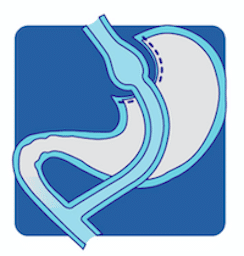
Roux-en-Y gastric bypass (RYGB) is a weight loss operation that has been performed globally for over 50 years. It has been considered the gold standard for weight loss surgery as all subsequent weight loss operations have been measured against it. RYGB is very effective in helping people lose a significant amount of weight and keep it off long-term.
RYGB works by creating a small pouch at the top of your stomach and then connecting it directly to a part of your small intestine. The result is you can only eat a small amount of food before you feel full. It also reduces the amount of calories and nutrients that your body absorbs. There are also important chemical effects from the surgery that reduce your hunger and appetite.
RYGB is major surgery, but it is usually performed laparoscopically, which means that it is done through small incisions in your abdomen. This makes the recovery time shorter and less painful than traditional open surgery.
RYGB is a very effective way to lose weight. Studies have shown that people who have RYGB surgery can lose an average of 70% of their excess weight over the first two years. This weight loss can help to improve a number of health conditions, including type 2 diabetes, sleep apnea, and high blood pressure.
RYGB is not without risks. Some of the potential complications include ulcer in the gastric pouch and bowel obstruction. However, the risks of RYGB are relatively low, and the benefits of weight loss can far outweigh the risks.
If you are considering RYGB surgery, it is important to talk to your doctor about the risks and benefits. They can help you decide if RYGB is the right choice for you.
Eligibility for RYGB surgery follows the same guidelines as for Bariatric surgery.
These criteria have been recently updated as per the International guidelines released by the International Federation for the Surgery of Obesity and Metabolic Disorders (IFSO) and the American Society for Metabolic and Bariatric Surgery (ASMBS) in August 2022
You can be eligible for weight-loss surgery if
Before going ahead with surgery you must be willing to make lifestyle changes, such as eating a healthy diet and exercising regularly.
If you are a good candidate for RYGB surgery, it can be a life-changing procedure. It can help you lose weight, improve your health, and improve your quality of life.
Here are some of the benefits of RYGB surgery:
Here are some of the risks of RYGB surgery:
If you are considering RYGB surgery, it is important to talk to your doctor about the risks and benefits. They can help you decide if RYGB is the right choice for you.